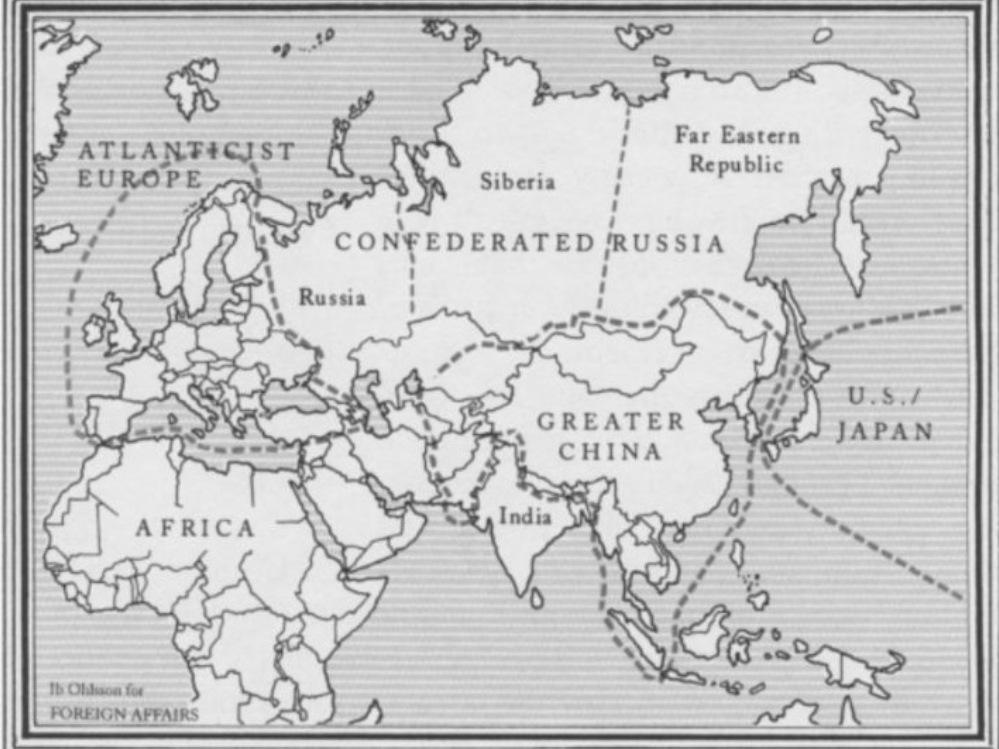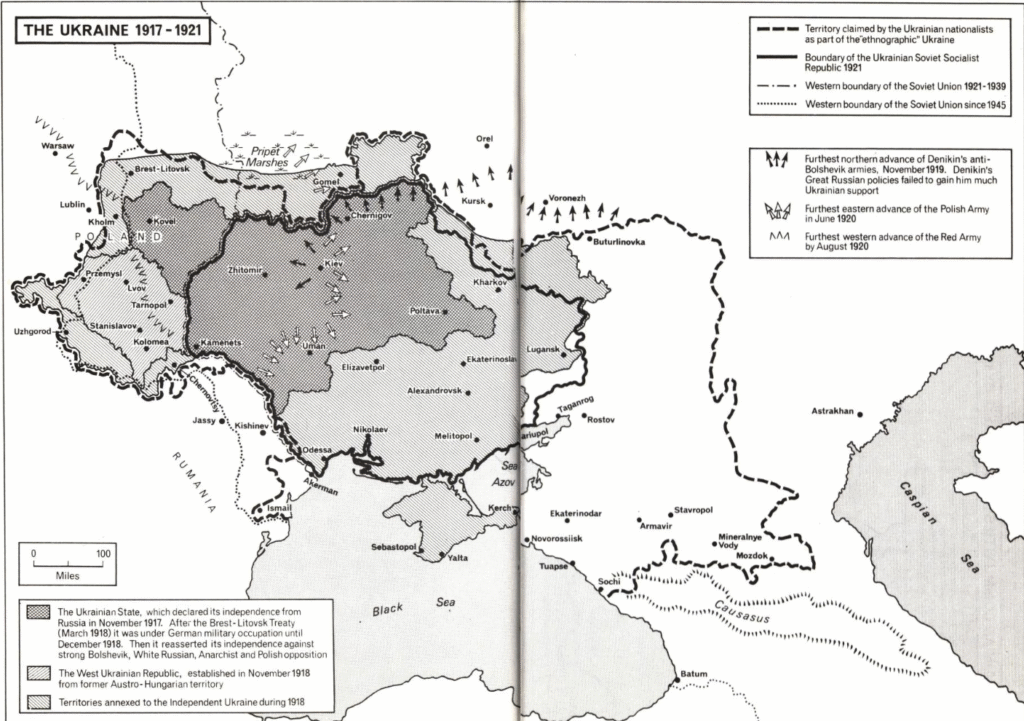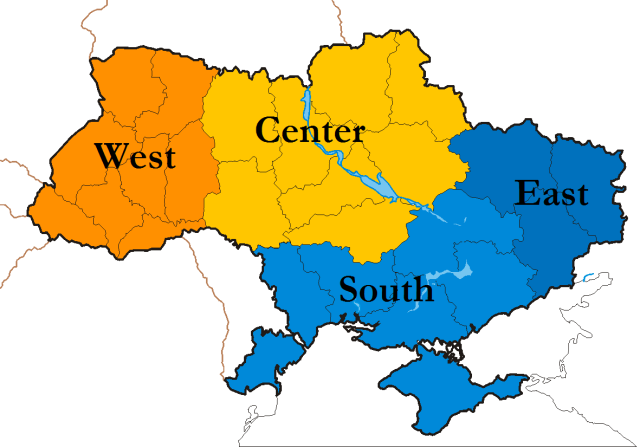

 A coal spoil heap rising over villages in the Donbas region of eastern Ukraine. Once a center of mining wealth, Donbas became the epicenter of conflict after 2014 and a focal point of international geopolitics. Photo: Viktoriia Novokhatska.
A coal spoil heap rising over villages in the Donbas region of eastern Ukraine. Once a center of mining wealth, Donbas became the epicenter of conflict after 2014 and a focal point of international geopolitics. Photo: Viktoriia Novokhatska.
There have been calls for mass expulsion of Russians and Russian-speaking Ukrainians. The aim is to erase them from both the history and the territory of Ukraine. Like Orwell’s “unperson,” Russians in Ukraine and Russian-speaking Ukrainians did not exist: they had never existed.
In accordance with the realpolitik advocated by the late Dr. Zbigniew Brzezinski, former U.S. Presidential national security advisor, and actively promoted by his disciples in the U.S. government and think tanks, Washington had, until President Trump was reelected in November 2024, campaigned for the establishment of an independent, anti-Russian, unitary Ukrainian state within its Soviet borders.
When Ukrainian presidents appeared pro-Russian, Washington orchestrated coups, first 2004, Orange Revolution I, then 2014, Orange Revolution II, with the acquiescence of Brussels1, and replaced them with anti-Russian politicians.
Besides overthrowing Ukrainian governments, the inconsistency in the position taken by the United States and the European Union on the future of a post-Soviet Ukraine further insures long-term instability.
No secession of the Russian region from Ukraine is to be allowed. Yet both supported the secession of the non-Serbian regions from Yugoslavia.
Ukraine is not to be restructured into an ethnically delineated federal republic. Yet, both used military force to restructure Bosnia into an ethnically delineated federal republic.
This inconsistency can be explained by the nature of Geopolitics. It is a game of chess in which weak nations are the pawns. The goal of U.S. foreign policy is to erase Russia from the map, as Yugoslavia had been erased. As Dr. Brzezinski wrote in his 1997 work, “The Grand Chessboard: American Primacy and Its Geostrategic Imperatives,” Russia is to be replaced by a loose confederation “composed of a European Russia, a Siberian Republic, and a Far Eastern Republic…A sovereign Ukraine is a critically important component of such a policy.”2 (Map 12)
Map 123
Partitioning Russia

Fragmentation would enable Washington and Brussels to exploit Russia’s mineral wealth and energy resources for their own benefit. Dr. Brzezinski insisted, however, “balkanizing” Russia is necessary for promoting the economic welfare of ordinary Russians. It will “unleash the creative potential of both the Russian people and the country’s vast natural resources…Each of the three confederated entities would also be more able to tap local creative potential, stifled for centuries by Moscow’s heavy bureaucratic hand…[and thereby] find it easier to cultivate closer economic relations with its neighbors [and Europe and the United States.]”4 Machiavellianism presented as humanitarianism.
While promoting the weaponization of a Ukrainian national identity to fragment Russia, as Vienna and Berlin did in World War I, Dr. Brzezinski expressed fear over the weakness of that identity. He wrote Ukrainians are “…52 million people ethnically and religiously sufficiently close to the Russians to make Russia into a truly large and confident imperial state.”5
Dr. Brzezinski noted “both America and Germany had become strong backers of Kiev’s separate identity. In July 1996, the U.S. secretary of defense declared, ‘I cannot overestimate the importance of Ukraine as an independent country to the security and stability of all of Europe,’ while in September, the German chancellor…went even further in declaring that ‘Ukraine’s firm place in Europe can no longer be challenged by anyone …No one will be able any more to dispute Ukraine’s independence and territorial integrity.’”6
Washington and Berlin rejected the border of the Soviet Union as drawn by Stalin, but accepts the borders Stalin drew for the fifteen union republics of the Soviet Union? In the long run, such a contradiction is untenable. Over the decades, many of those borders had been drawn and redrawn, expanding or contracting, including Ukraine’s. Which ones are legitimate? Why those? Why not these? (Maps 13)
Map 137

A very strong case can be made that the borders of the West region of Ukraine constitute the legitimate borders of a Ukrainian state, with Lviv, birthplace of Ukrainian nationalism, as the capital. (Map 14)
Map 148
Ukraine’s main regions (in sense of oblast groupings)

The West region of Ukraine represents 24 percent of the territory of Ukraine. It contains the seven provinces of Lviv, Ternopil, Ivano-Frankivsk, Volyn, Rivne, Zakarpattia, and Chernivits. Here, unlike the rest of Ukraine, Catholicism, in the Ukrainian Greek Catholic Church, is the predominate religion. Here resides 20 percent of the population of Ukraine. They are the most vocal nationalists dedicated to an ethnically homogeneous unitary state. Within these borders, they get their wish.
Washington and Berlin back the territorial integrity of Ukraine in the name of “the security and stability of all of Europe.” Who determines what is “the security and stability of all of Europe? And how is that done?
While championing the territorial integrity of Ukraine, Washington and Berlin violated the territorial integrity of Yugoslavia; violated the territorial integrity of the Union of Serbia and Montenegro; and violated the territorial integrity of Serbia.
Actions have consequences. The U.S. sponsored, EU endorsed, 2014 coup in Kyiv provoked a civil war in the Donbas region of East Ukraine where local Russians declared their independence. In an effort to end the conflict, in 2015, France, Germany, and the Organization for Security and Cooperation in Europe (OSCE), negotiated the Minsk II agreement between Russia and Ukraine.
Signed by representatives from the OSCE, Russia, Ukraine, and the Donbas separatists, the agreement consisted of a package of measures that included “An immediate and comprehensive ceasefire. Withdrawal of all heavy weapons by both sides… An exchange of hostages and prisoners…Constitutional reform in Ukraine including decentralization …with specific mention of Donetsk and Luhansk. interim self-government for the Donetsk and Luhansk regions, in accordance with Ukrainian law, and acknowledge their special status by a resolution of parliament…Restore full control of the state border by the government of Ukraine.”9
Ukraine refused to implement the Minsk II agreement; “in the words of Richard Sakwa, Professor of Russian and European Politics at the University of Kent, “…neither the U.S. nor the EU put serious pressure on Kyiv to fulfill its part of the agreement.’”10
In 2019, a non-politician, Volodymyr Zelenskyy was elected president of Ukraine. He had campaigned on a promise to bring peace and reconciliation to Ukraine. He did neither. He refused to “reform its constitution, decentralize state authority, and provide autonomy for the Russian-speaking eastern provinces, with ‘special status’ and ‘self-governance’ for the regions Donetsk and Lugansk”11 as stipulated in the Minsk II agreement.
In his interview with Der Spiegal, February 9, 2023, Zelenskyy said “he looked at the agreements as mere ‘concessions’ on Ukraine’s part and never intended to implement them. The only use they were made of, Zelenskyy claims, was prisoner swap with the two breakaway east Ukrainian republics of Luhansk and Donetsk.”12
Two months earlier, in an interview with Die Zeit, December 7, 2022, German Chancellor Merkel, an architect of the Minsk II agreement, had made a disturbing admission.
She said “…the Minsk Agreement of 2014 was an attempt to give Ukraine time. Ukraine used this time to become stronger, as you can see today. The Ukraine of 2014/15 is not the Ukraine of today. An illustrative example was the battle for Debaltseve. At the beginning of 2015, Putin could easily have overrun them at that time. And I very much doubt that the NATO countries could have done as much then as they do today to help Ukraine.”13
Three weeks later, in an Interview with Kyiv Independent, December 28, 2022, former French President Francois Hollande, who had collaborated with the German Chancellor on the Minsk II agreement, corroborated what she had said.
“Yes, Angela Merkel is right on this point. The Minsk agreements stopped the Russian offensive for a while. What was very important was to know how the West would use this respite to prevent any further Russian attempts…Since 2014, Ukraine has strengthened its military posture. Indeed, the Ukrainian army was completely different from that of 2014. It was better trained and equipped. It is the merit of the Minsk agreements to have given the Ukrainian army this opportunity.”14
By their own words, Zelenskyy, Merkel, and Hollande have indicted themselves. They have admitted to committing a “crime of aggression” as defined by Article 8 in the Rome Statute of the International Criminal Court.
“For the purpose of this Statute, ‘crime of aggression’ means the planning, preparation, initiation or execution, by a person in a position effectively to exercise control over or to direct the political or military action of a State, of an act of aggression which, by its character, gravity and scale, constitutes a manifest violation of the Charter of the United Nations.”15
The Preamble of the United Nations’ Charter reads “…to establish conditions under which justice and respect for the obligations arising from treaties and other sources of international law can be maintained…”16
The revelations by Zelensky, Merkel, and Hollande on the machinations behind Minsk II showed that although Dr. Brzezinski died in 2017, his ideas of realpolitik continue to exert profound influence on the conduct of U.S. and EU foreign policy.
More than five years after his death, Piotr Pietrzak, Ph.D. could write in ”The Brzezinski Doctrine And NATO’s Response To Russia’s Assault On Ukraine,” Modern Diplomacy, January 12, 2023, “Although Brzezinski is dead, his work is very much alive; the Biden administration follows Brzezinski’s geostrategic blueprint, which supports Ukraine militarily, logistically, diplomatically, and politically. Zbigniew Brzezinski’s son Mark Brzezinski serves as the United States Ambassador to Poland and helps his superiors implement his father’s geostrategic vision on the ground.”17
That “geostrategic vision” is to fragment the Russian Federation, which “consists of 83 federal entities, including 21 non-Slavic republics” into as many Western client states as possible.
Within the U.S. foreign policy establishment Dr. Brzezinski’s influence remains pervasive. His promotion of his geostrategic objectives is an example of the “long march through the institutions.”18 But with the addition of a “cult of personality.”19
He was Counselor and Trustee of the Center for Strategic & International Studies,(CSIS) for more than three decades.
“Dr. Brzezinski’s intellectual contributions and influence at the Center for Strategic and International Studies cannot be overstated,” said John J. Hamre, CSIS President and CEO. “He will not live to guide us through this perilous time, but he has left behind hundreds of analysts and followers who will pick up the challenge to guide America.”20
In his memory and to advance his geopolitical ideas, CSIS established:
The Brzezinski Institute on Geostrategy “…at CSIS is well-named because it will be a permanent home for a strong, effective American foreign policy…with a goal of developing policy-relevant analysis and recommendations. The Institute will also seek to develop a new generation of strategic policy thinkers at home and abroad…Through this work, the Institute will help to inform today’s policymakers and train tomorrow’s global leaders.”21
The Brzezinski Chair in Global Security and Geostrategy “to advance understanding in the fields of geostrategy, international security, and global politics.”22
The Zbigniew Brzezinski Annual Prize “honors the legacy of Dr. Brzezinski by recognizing and promoting the importance of geostrategic thinking with a transcending moral purpose.”23
In his 1998 interview with Le Nouvel Observateur on Afghanistan, Dr. Brzezinski revealed his “transcending moral purpose” to be “the end justifies the means.”
Question: The former director of the CIA, Robert Gates, stated in his memoirs that the American intelligence services began to aid the Mujahiddin in Afghanistan six months before the Soviet intervention. In this period you were the national security adviser to President Carter. You therefore played a key role in this affair. Is this correct?
Brzezinski: Yes. According to the official version of history, CIA aid to the Mujahiddin began during 1980,that is to say, after the Soviet army invaded Afghanistan on December 24, 1979. But the reality, closely guarded until now, is completely otherwise: Indeed, it was July 3, 1979 that President Carter signed the first directive for secret aid to the opponents of the pro-Soviet regime in Kabul. And that very day, I wrote a note to the president in which I explained to him that in my opinion this aid was going to induce a Soviet military intervention [emphasis added throughout].
Q: Despite this risk, you were an advocate of this covert action. But perhaps you yourself desired this Soviet entry into war and looked for a way to provoke it?
B: It wasn’t quite like that. We didn’t push the Russians to intervene, but we knowingly increased the probability that they would.
Q: When the Soviets justified their intervention by asserting that they intended to fight against secret US involvement in Afghanistan, nobody believed them. However, there was an element of truth in this. You don’t regret any of this today?
B: Regret what? That secret operation was an excellent idea. It had the effect of drawing the Russians into the Afghan trap and you want me to regret it? The day that the Soviets officially crossed the border, I wrote to President Carter, essentially: “We now have the opportunity of giving to the USSR its Vietnam war.” Indeed, for almost 10 years, Moscow had to carry on a war that was unsustainable for the regime, a conflict that brought about the demoralization and finally the breakup of the Soviet empire.
Q: And neither do you regret having supported Islamic fundamentalism, which has given arms and advice to future terrorists?
B: What is more important in world history? The Taliban or the collapse of the Soviet empire? Some agitated Moslems or the liberation of Central Europe and the end of the cold war?24
The Soviet-Afghan war lasted 10 years, resulted in the deaths of over one million Afghans, created five million Afghans refugees, and ended with a Soviet defeat.25 It was a prequel for the American-Afghan war which lasted 20 years, resulted in 240,000 Afghan deaths, 3.5 million internally displaced, 2.5 million refugees, and ended in an American defeat. These were the results of Dr. Brzezinski’s geostrategic thinking.
1 Eric Zuesse, “How and why the U.S. Government Perpetrated the 2014 Coup in Ukraine” Modern Diplomacy, June 4, 2018 https://moderndiplomacy.eu/2018/06/04/how-and-why-the-u-s-government-perpetrated-the-2014-coup-in-ukraine
2 Zbigniew Brzezinski, “A Geostrategy for Eurasia,” Foreign Affairs, Vol. 76, No. 5 (Sep – Oct, 1997), p. 56 A Geostrategy for Eurasia on JSTOR
3 Zbigniew Brzezinski, “A Geostrategy for Eurasia,” Foreign Affairs, Vol. 76, No. 5 (Sep – Oct, 1997), p. 60 https://www.jstor.org/stable/20048199?read%20now=1&refreqid=excelsior%3A6993c0cde587f2bbf6f0e8b2b24047ee&seq=11
4 Zbigniew Brzezinski, “A Geostrategy for Eurasia,” Foreign Affairs, Vol. 76, No. 5 (Sep – Oct, 1997), p. 56 https://www.jstor.org/stable/20048199?read%20now=1&refreqid=excelsior%3A6993c0cde587f2bbf6f0e8b2b24047ee&seq=11
5 Zbigniew Brzezinski, “The Grand Chessboard: American Primacy and Its Geostrategic Imperatives,” Basic Books, 1997, p. 92. https://swprs.org/wp-content/uploads/2022/02/Grand-Chessboard_Brzezinski_1997.pdf
6 Zbigniew Brzezinski, “The Grand Chessboard: American Primacy and Its Geostrategic Imperatives,” Basic Books, 1997, p. 113. https://swprs.org/wp-content/uploads/2022/02/Grand-Chessboard_Brzezinski_1997.pdf
7 Martin Gilbert, Atlas of Russian History, Dorset Press, 1985, p. 97, Atlas of Russian History : Martin Gilbert : Free Download, Borrow, and Streaming : Internet Archive
8 Edward W. Walker, “Ukraine 2014-15,” Eurasian Geopolitics, https://eurasiangeopolitics.com/ukraine-maps/
9 “What are the Minsk agreements on the Ukraine conflict?,” Reuters, December 6, 2021, What are the Minsk agreements on the Ukraine conflict? | Reuters
10 Ted Snider, “The War in Ukraine: Missed Opportunities,” Anti-war.com, February 6, 2023, https://original.antiwar.com/ted_snider/2023/02/05/the-war-in-ukraine-missed-opportunities
11 Ben Norton, “Ukraine’s Zelensky admits he sabotaged Minsk peace deal with Russia, West blocked negotiations,” Eurasia, February 10, 2023, https://geopoliticaleconomy.com/2023/02/10/ukraine-zelensky-minsk-peace-russia/
12 Al Mayadeen, “Zelensky admits he never intended to implement Minsk agreements,” MRonline, February 11, 2023, https://mronline.org/2023/02/11/zelensky-admits-he-never-intended-to-implement-minsk-agreements/
13 What position exactly did Merkel express about the Minsk agreements in this December 2022 interview?” Stack Exchange, 2023-08-10, https://politics.stackexchange.com/questions/77139/what-position-exactly-did-merkel-express-about-the-minsk-agreements-in-this-dece
14 What position exactly did Merkel express about the Minsk agreements in this December 2022 interview?” Stack Exchange, 2023-08-10, https://politics.stackexchange.com/questions/77139/what-position-exactly-did-merkel-express-about-the-minsk-agreements-in-this-dece
15 “Rome Statute of the International Criminal Court, Article 8 bis – Crime of Aggression,” World.Public.Law, August 30, 2023, https://www.public.law/world/rome_statute/article_8_bis_crime_of_aggression
16 “Preamble to the Charter of the United Nations,” June 26, 1945, http://www.un-documents.net/ch-pre.htm
17 Piotr Pietrzak, Ph.D., “The Brzezinski Doctrine And NATO’s Response To Russia’s Assault On Ukraine,” Modern Diplomacy, January 12, 2023, https://moderndiplomacy.eu/2023/01/12/the-brzezinski-doctrine-and-natos-response-to-russias-assault-on-ukraine/
18 Daniel Frost, “Long marches, long revolutions,” MRonline, April 13, 2022, https://mronline.org/2022/04/13/long-marches-long-revolutions/
19 Rebecca M. Kulik , “Cult of Personality,” Britannica, April 7, 2025 https://www.britannica.com/topic/cult-of-personality
20 “CSIS Mourns the Loss of Zbigniew Brzezinski,” Press Release, May 26, 2017, https://www.csis.org/news/csis-mourns-loss-zbigniew-brzezinski
21 “CSIS Creates Brzezinski Institute on Geostrategy,” Press Release, September 26, 2014, https://www.csis.org/news/csis-creates-brzezinski-institute-geostrategy
22 “Brzezinski Chair in Global Security and Geostrategy,” CSIS, 2003, https://www.csis.org/programs/brzezinski-chair-global-security-and-geostrategy
23 “The Zbigniew Brzezinski Annual Prize and Lecture,” CSIS, October 5, 2017, https://www.csis.org/events/zbigniew-brzezinski-annual-prize-and-lecture
24 “1998 Interview with Zbigniew Brzezinski on Afghanistan in Le Nouvel Observateur,” from the website of David N. Gibbs, Professor of History, University of Arizon Brzezinski Interview | David N. Gibbs
25 Meg Cramer, “Mass Murder in Afghanistan: 40 Years of Conflict,” The Institute of World Politics, December 18, 2020, https://www.iwp.edu/articles/2020/12/18/mass-murder-in-afghanistan-40-years-of-conflict
26 Ben King and Jeremy Singer-Vine, “The Afghan War, By The Numbers,” BuzzFeed News, August 17, 2021, https://www.buzzfeednews.com/article/benking/the-afghan-war-by-the-numbers
The library is dedicated to the memory of Secwepemc Chief George Manuel (1921-1989), to the nations of the Fourth World and to the elders and generations to come.
access here